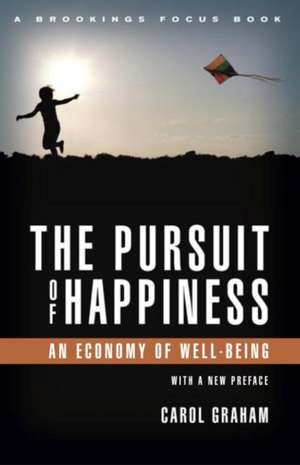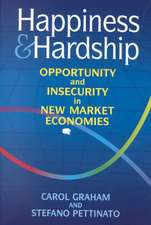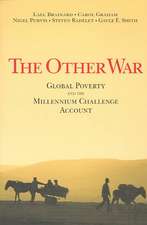The Pursuit of Happiness: An Economy of Well-Being: Brookings FOCUS Book
Autor Carol L. Grahamen Limba Engleză Paperback – 8 aug 2012
In The Pursuit of Happiness, renowned economist Carol Graham explores what we know about the determinants of happiness and clearly presents both the promise and the potential pitfalls of injecting the "economics of happiness" into public policymaking. While the book spotlights the innovative contributions of happiness research to the dismal science, it also raises a cautionary note about the issues that still need to be addressed before policymakers can make best use of them.
Preț: 192.14 lei
Nou
Puncte Express: 288
Preț estimativ în valută:
36.77€ • 39.93$ • 30.89£
36.77€ • 39.93$ • 30.89£
Carte tipărită la comandă
Livrare economică 22 aprilie-06 mai
Preluare comenzi: 021 569.72.76
Specificații
ISBN-13: 9780815724049
ISBN-10: 0815724047
Pagini: 164
Ilustrații: black & white illustrations, black & white tables, figures
Dimensiuni: 140 x 216 x 3 mm
Greutate: 0.18 kg
Ediția:Rev ed.
Editura: Brookings Institution Press
Colecția Brookings Institution Press
Seria Brookings FOCUS Book
ISBN-10: 0815724047
Pagini: 164
Ilustrații: black & white illustrations, black & white tables, figures
Dimensiuni: 140 x 216 x 3 mm
Greutate: 0.18 kg
Ediția:Rev ed.
Editura: Brookings Institution Press
Colecția Brookings Institution Press
Seria Brookings FOCUS Book
Notă biografică
Carol Graham is the Leo Pasvolsky Senior Fellow in Global Economy and Development at the Brookings Institution. She is also College Park Professor at the University of Maryland's School of Public Policy. Her previous books include Happiness around the World: The Paradox of Happy Peasants and Miserable Millionaires (Oxford) and Happiness and Hardship: Opportunity and Insecurity in New Market Economies, with Stefano Pettinato (Brookings).
Descriere
In The Pursuit of Happiness, renowned economist Carol Graham explores what we know about the determinants of happiness and clearly presents both the promise and the potential pitfalls of injecting the "economics of happiness" into public policymaking. While the book spotlights the innovative contributions of happiness research to the dismal science, it also raises a cautionary note about the issues that still need to be addressed before policymakers can make best use of them.
















